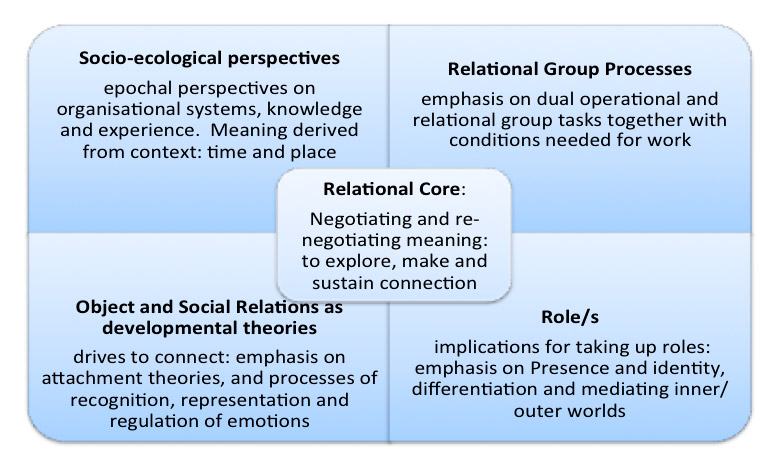Theoretical background to relational practice
The term relational has prolific use and is frequently applied to describe practices which put people and relationships first [1]. My own perspective on this derives from the concept of the Relational Turn, where it is used across a range of professional discourses: in sociology it emphasises the study of the social relationship itself [2], and from psychoanalysis an idea that this is an expanded theory of interaction [3].
For myself, I bring together theories from the world of: systems-psychodynamics which place value on knowledge and experience as relating to particular contexts of time and place; developmental theories of the individual, which emphasise the social origins of human drives and interactions; theories about group behaviour and the nature of the unconscious which are similarly developmental, and attend to the conditions which group members need to create so as to function well; and finally role, the intersection between inner worlds of thoughts and feelings, and the outer world of behaviours and actions. How can we create enough space in our interactions with others, so as to bring multiple aspects of ourselves and our identities to our work?
These come together in a theory for understanding and working with groups and organisations which I have called The Relational Terrain. This is a theory which derives from practice and from attempting to work with the dilemmas which clients bring as to how they can effect change within themselves, their organisations and their sectors. At the core of The Relational Terrain lies the ability to explore, make and sustain connections, with one’s self, one’s colleagues, with the task being attempted. Negotiating meaning, and re-negotiating it, as new and different perspectives come to the fore, is a key intention.
You might wonder why such an approach is needed. A glance at the world of present day politics reveals just how many diversionary behaviours come to the fore, capture attention, take the discussion off course when complex, and contested matters are at stake. Staying connected, seeing work through, and dealing with its unexpected consequences are all aspects of mind-ful, resource-ful and relational practice.

Copyright © 2018 Karen Izod
References:
[1] Dépelteau, F., What is the Direction of the “Relational Turn”?. In: Powell, C. and Dépelteau, F., eds., (2013) Conceptualising Relational Sociology: Ontological and Theoretical Issues. NY: Palgrave Macmillan, pp. 163–185. Izod, K. 4,446 books on Amazon on relational practice, but what does it mean? (Presentation to Tavistock Institute ‘Food for Thought’ series) 7th September 2017. Podcast available.
[2] Prandini, R. (2015) Relational Sociology: a well-defined sociological paradigm or a challenging ‘relational turn’ in sociology. International Review of Sociology. 25 (1), pp. 1-14. Donati, P. (2011) Relational Sociology: a New Paradigm for the Social Sciences. Oxford/New York: Routledge.
[3] Beebe, B. and Lachmann, F. (2003) The relational turn in psychoanalysis: A dyadic systems view from infant research. Contemporary Psychoanalysis. 39 (3), pp. 379-409.